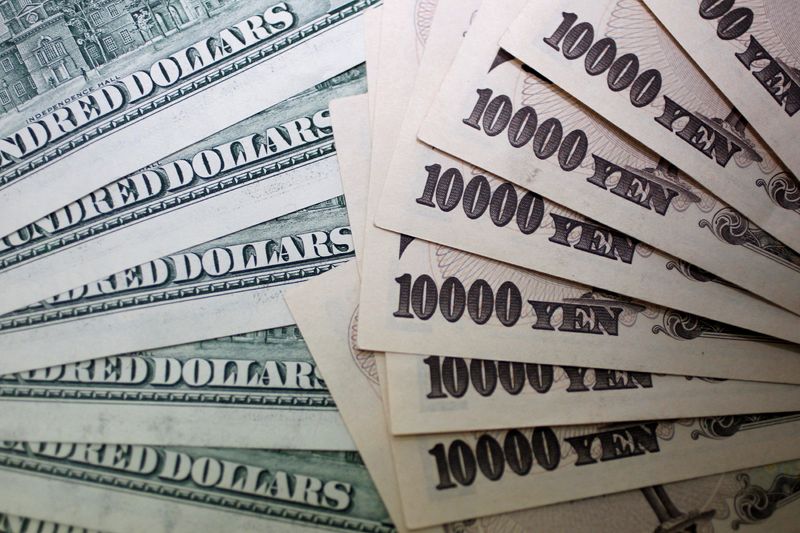By Brigid Riley
TOKYO (Reuters) -The yen remained under pressure on Thursday as the Bank of Japan kept ultra-low interest rates steady, while the U.S. dollar consolidated ahead of jobs data later this week and the U.S. presidential election next week.
The Japanese currency has taken a beating this month as dollar and US government bond yields hover around their highest since July.
The yen has fallen more than 6% in October and is on track for what would be the biggest monthly loss against the dollar since November 2016.
The political turmoil in Japan has only added to the yen’s woes, raising uncertainty about the country’s fiscal and monetary policy prospects.
The BOJ held rates steady on Thursday and broadly maintained its forecast that inflation will hover near its 2% inflation target in coming years, signaling its willingness to further roll back its massive monetary stimulus.
Analysts are divided on the prospect of further rate hikes towards the end of the year, focusing on BOJ Governor Kazuo Ueda’s post-meeting briefing for clues on the pace and timing of further rate hikes.
The yen fell 0.02% to 153.34 against the dollar, largely unchanged after the BOJ’s decision as it was not far from a three-month low of 153.885 on Monday.
“Any strengthening in the yen at this point would likely be the result of a general weakening of the US dollar as interest rates start to adjust,” said Sean Teo, sales trader at Saxo.
The yen’s recent decline could make many traders cautious as excessive weakening could attract the attention of Japanese authorities, he added.
Markets received more economic data from China ahead of the BOJ’s decision. The National Statistics Bureau’s Manufacturing PMI showed activity increased in October for the first time in six months.
The official PMI rose to 50.1 in October from 49.8 in September, just above the 50 mark that separates growth from contraction and better than the average forecast of 49.9 in a Reuters poll.
The price remained stable and the last trade was at 7.1309.
JOBS REPORT, PRESIDENTIAL ELECTION IN FOCUS
US non-farm payrolls close the week on Friday ahead of Tuesday’s presidential election.
Some investors are betting that Republican candidate Donald Trump will win, although he is still neck-and-neck with Vice President Kamala Harris in several polls.
The , which measures the currency against six major rivals, rose 0.08% to 104.17, after softening the day before. The index reached its highest point since July 30 at 104.63 on Tuesday.
“Data confirmed the underlying strength of the US economy overnight, largely supporting what was already built into the price, rather than providing a new catalyst for renewed upside,” Westpac analysts wrote in a note.
U.S. private payroll growth rose sharply in October, data showed on Wednesday, overcoming fears of a temporary disruption from hurricanes and strikes.
Meanwhile, separate data showed the US economy grew at an annual rate of 2.8% in the third quarter, slightly less than the 3% that economists had expected.
The euro fell 0.06% to $1.0849, after rising as high as $1.0871 on Wednesday. Regional inflation data and euro zone GDP came in stronger than expected on Wednesday, prompting traders to scale back their bets on an outsized European Central Bank rate cut in December.
Sterling was at $1.29445, down 0.13% so far on the day.

Elsewhere, the Australian dollar fell 0.02% to $0.6573 after September domestic retail sales missed estimates and rose just 0.1%. Analysts had expected a gain of 0.3% in September.
The New Zealand dollar rose 0.04% to $0.5974.


